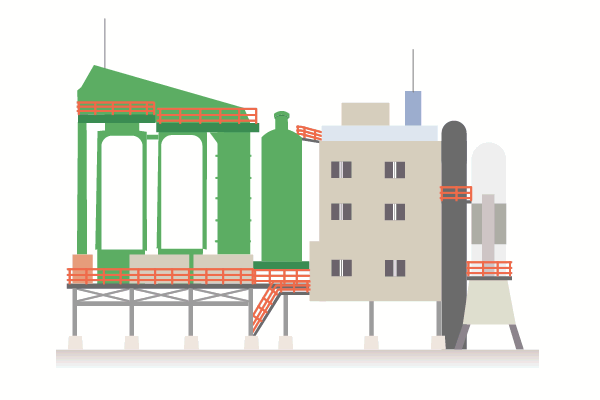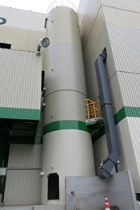Product Information
Asphalt Mixing Plants
Asphalt plants are Tanaka Iron Works' primary business. Our products in this field are constantly evolving, both through technical development and in response to the needs of our customers.
From diversifying needs to environmental considerations, we face a variety of requirements everyday. To respond to these swiftly without compromising on quality, we have established a dedicated section to continue our pursuit of customer satisfaction.

Example Installations
Standard
TAP-1520, TRD-60EA, ST-100+120, ASPUC-FACE Control Panel
This is our standard asphalt mixing plant. Nevertheless, it still incorporates cutting-edge technology throughout its design. Designed with particular focus on the environment, the plant itself is well sealed. Its vibrating screens have a two-layer anti-vibration structure, keeping dust and particles to an absolute minimum. It is easy to transport, and the batch tower interior is spacious. The exterior staircase and inverter-controlled skip equipment also significantly reduces running costs compared to those of previous plants. Additionally, the Tanaka Iron Works safety standards - predecessors to the "Asphalt Mixing Plant Safety Requirements" recognized by JIS in February 2010 - are incorporated throughout.




Urban-Type Plants
TAP-1520, TRD-60, ST-80+100+120 ASPUC-FACE Control Panel, Truck Driver Assistance System
The entire plant is contained within a shelter to minimize the impact of dust, particles, noise, and vibrations on its surroundings. Overturning existing expectations for an asphalt mixing plant, its design and color are crafted to suit its surroundings. It is also designed for space-saving and efficiency, with hoppers and belt conveyors under the stockyard and the upper sections of the asphalt tanks used as additive tanks. To limit dust and fine particle emission, the scavenging fan system installation has been expanded to cover both vibrating screens and hot bins, and batch tower floor chutes can be cleaned with a broom alone. When extracting material from beneath the mixer, airborne dust is reduced through measures like dust-proof cloth on trolleys and an airtight mixer floor. Overloading and spillage during shipping is reduced by the implementation of a truck guidance assist system using an electronic shipping notice board. Assist monitors below all silos make the current loading status clear to drivers.





Highway Plants
TAP-3000G-H, ASPUC-FACE Control Panel, Asphalt Mixing Plant Designed for Highway Construction
For highway surfaces, the ability to ship a stable product while responding to changes in materials and installation environment is vital. TAP-3000G-H offers material processing capacity of 210 t/h for aggregate with 5% moisture. With 3,000kg mixing, 70-batch processing is possible.
Designed to be compact and movable, this is a large-scale plant that nevertheless requires fewer transport vehicles. Its entirely unit-based design makes it extremely compact and offers ease of loading, transport, and storage. Measures have also been taken throughout to ensure that components remain attached during transport, offering additional peace of mind. By making the "transport, assembly, disassembly, transport" work cycle faster, this plant also helps reduce the time required for construction.





Environmental Considerations
Buildings can have a significant effect on a company's image. Asphalt mixing plants in particular are status symbols among material plants, making them the most eye-catching type of building and highly prominent in their surroundings. Tanaka Iron Works offers a new type of plant, placing importance not only on appearance but also on harmony with the environment.

Protective shelters surrounding the plants themselves prevent dust, fine particles, and odors from escaping. Whatever the actual shape of the plant, the shelter provides a simple exterior appearance that does not harm the local scenery. As well as these beneficial effects for the local environment, the shelter also keeps materials warmer, which helps make shipping more efficient.

Energy Efficiency
Fossil fuels are earth resources, and energy efficiency is an important issue as stocks of these resources are depleted. Tanaka Iron Works seeks to resolve energy problems by increasing the heat efficiency of burners, dryers, and other equipment directly related to CO2 and energy efficiency.



Meeting Your Needs

From standard products to one-off orders, Tanaka Iron Works' entire staff is united in their desire to ensure your satisfaction.
If you have specific needs, we can propose designs for plants that meet them. We continue to support your operations even after installation, by suggesting ways to reduce cost and performing maintenance rapidly.
Hot Storage Silos

Asphalt mixture is a "raw" material. It degrades in quality with the passage of time.
We deploy unique technology in our hot storage silos to extend asphalt's effective storage period.
Five benefits of TANAKA's hot storage silos
- Longer storage period
- Faster shipping
- Lower operational costs
- Environmental considerations
- Expanded supply area
Introducing hot storage silos also helps reduce costs while the plant is in operation.
Satellite Silo

As demand increases for aesthetically pleasing and livable urban environments, asphalt production in cities becomes more difficult.
One way to resolve this problem is to produce materials just outside the city, then temporarily store it in the city to be supplied as needed.
Our satellite silos are designed to be installed where space is limited, offering a 24-hour supply of materials to road construction works without obstructing the surrounding environment.
Liquid Seal Gate

The most important part of preventing asphalt from degrading in quality while in storage is the seal on the storage facility.
To increase the effectiveness of this seal, we filled the seal gate with liquid. Liquid seals are extremely effective at preventing air, the prime factor in causing degradation, from entering the tank. Liquid seals also eliminate degradation of functionality due to abrasion.
Skip Control Equipment

Ecologically sound, smooth movement through inverter control.
skip equipments for winching buckets of material up for storage move more frequently than any other part of the plant, and are subject to severe wear as a result.
By using inverters for winch control, Tanaka Iron Works greatly reduces the load placed on winches, wires, and the entire skip equipment while raising and lowering buckets.
This increases the lifespan of replacement components and reduces wheel and rail abrasion, potentially extending the life of the system as a whole.
What's more, regenerative braking is a standard feature of our inverter control systems, reducing the peak current during startup and restoring energy to the power source when braking. This reduces the power consumption of the entire skip equipment.
Aggregate Transport and Storage Equipment

High-volume aggregate transport and storage equipment.
Store a range of materials for supply to the plant. Transport equipment is not one-size-fits-all. Instead, the most appropriate solutions for each installation space are selected, resulting in aggregate transport and storage solutions that take advantage of each individual plant's unique characteristics.
Corrugated silos are high-volume aggregate storage silos made from corrugated sheet metal piping, a building material offering superior lightness, strength, and cost-effectiveness.
Vertical Belt Conveyors
Unlike standard sloping belt conveyors, these carry materials vertically upward.
This reduces the horizontal space required to an absolute minimum, making it a highly effective approach for small-footprint plants, particularly in urban areas. By covering the entire mechanism, dust and fine particles are also prevented from escaping.
Shuttle Belt Conveyors
In a shuttle conveyor system, a motor moves the conveyor itself within a set range.
This motion changes the effective machine length, making it possible to transport material to a different line (silo).
Shuttle conveyor systems are notable for their ability to sort multiple ways with a limited number of conveyors.